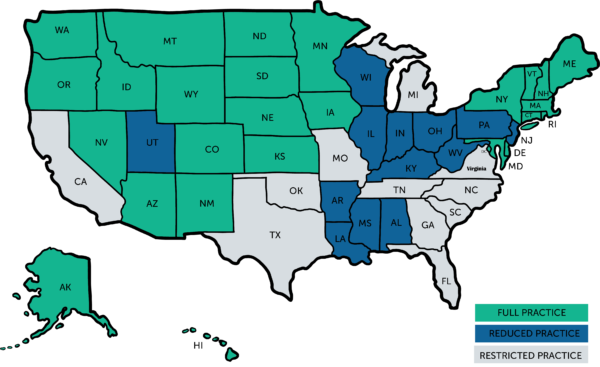Nurse Practitioners across the United States play an integral role in the healthcare industry. As their scope of work has changed since the inception of the profession in the 1960s, NPs have demonstrated their capabilities to practice without a supervising physician. After years of advocacy and proven studies, NPs are being heard. As of August 2021, several states across the U.S. began adopting Full Practice Authority, allowing NPs to prescribe, diagnose, and treat patients without physician oversight. The advocacy and legislation continues, expanding access to medical care and reducing the number of states with Restricted Practice and Reduced Practice status.
The three types of practice regulations for NPs are:
- Full Practice Authority: State practice and licensure laws permit all NPs to prescribe, diagnose, and treat patients without physician oversight. NPs may fully evaluate and diagnose patients, order and interpret tests and screenings, initiate and manage treatments, prescribe medications, and operate independent practices.
- Reduced Practice: NPs can diagnose and treat patients but need physician oversight to prescribe medications and controlled substances.
- Restricted Practice: NPs require physician oversight to diagnose, prescribe, and treat patients.
Status of Full Practice Authority By State

Full Practice Authority by State – Nurse Practitioners
Full-Practice Authority States |
Reduced Authority States |
| Alaska | Alabama |
| Arizona | Arkansas |
| Colorado | Illinois |
| Connecticut | Indiana |
| Delaware | Kentucky |
| District of Columbia | Louisiana |
| Hawaii | Mississippi |
| Idaho | New Jersey |
| Iowa | Ohio |
| Kansas | Pennsylvania |
| Maine | Utah |
| Maryland | West Virginia |
| Massachusetts | Wisconsin |
| Minnesota | |
| Montana |
Restricted Authority States |
| Nebraska | |
| Nevada | California |
| New Hampshire | Florida |
| New Mexico | Georgia |
| New York | Michigan |
| North Dakota | Missouri |
| Oregon | North Carolina |
| Rhode Island | Oklahoma |
| South Dakota | South Carolina |
| Vermont | Tennessee |
| Washington | Texas |
| Wyoming | Virginia |
So What Does This Mean for Nurse Practitioners and Their Professional Liability Policy?
It is incredibly important that NPs review their malpractice/professional liability policy every year before renewing. Making sure you are covered for any unforeseen circumstances will protect you, your career, your license and your assets. Keep in mind that some professional liability insurance companies may not cover your full scope of practice as legislation changes in your filing state, and scope of practice guidelines vary by state. We encourage you to ensure that your policy covers you wherever you go (from clinic to clinic, patient to patient, moonlighting, etc.) and no matter what your SOP within your filing state is.
America Map Vectors by Vecteezy



